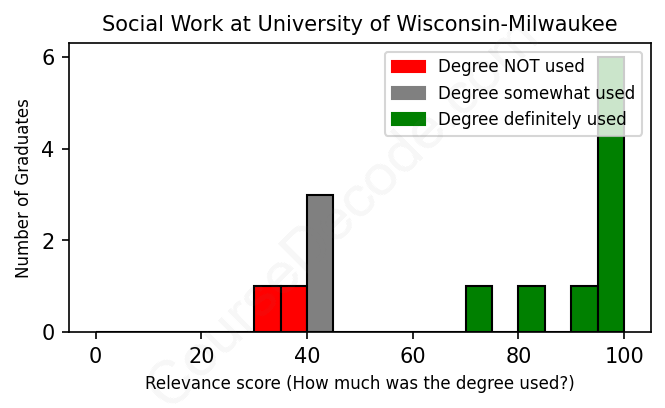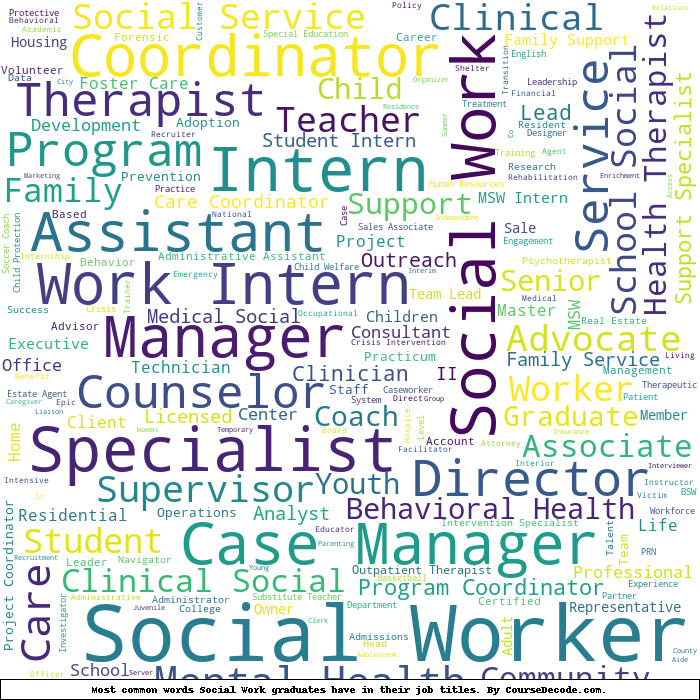
First, some facts. Of the Social Work graduates from University of Wisconsin-Milwaukee we've analyzed , here's how many have used (or NOT used) their degree in their career:

These are estimates based on AI analysis of 14 LinkedIn profiles (see below).
The verdict? Above average. Overall, with an average relevance score of 74%, Social Work graduates from University of Wisconsin-Milwaukee have a higher likelihood (+7%) of finding work in this field compared to the average graduate across all fields:
And for comparison, here's the chart for all profiles we've looked at across all degrees.
Also, after graduating, 50% of these graduates have pursued further education other than another Bachelor's degree (such as a Masters degree or other), compared to the average across all profiles of 35%. This suggests you may need more than just a Bachelors degree to be competitive as a Social Work graduate.
See the details:
|
Relevance score: 38% We think this person has NOT gone into a career related to their degree. We think this person has NOT gone into a career related to their degree.
DEGREE INFOGraduated in 2015 from University of Wisconsin-Milwaukee with a Bachelor of Science - BS in Social Work. Also pursued further education since (see below). JOB HISTORY SINCE GRADUATIONYouth Care Worker - St. Rose Center Lad Lake 2015 - 2015 Program Naturalist  Alliance Redwoods Conference Grounds Jan 2016 - Dec 2016 Senior Administrative Assistant  Fort Hays State University Mar 2017 - Jan 2018 Office Educational Assistant  WAUWATOSA SCHOOL DISTRICT Jan 2018 - Jun 2019 Client History Interviewer  Northwestern Mutual Jun 2019 - May 2020 Client Service Representative  Northwestern Mutual May 2020 - Dec 2020 High School Counselor  Hays High School Aug 2023 - Present FURTHER DEGREES DONE SINCE GRADUATINGMaster's degreeFort Hays State University 2021 - 2023 ABOUTNo information provided. |
The top 10 most common jobs done by the graduates we've analyzed (ranked most common to least) are:
From analyzing the LinkedIn profiles of graduates with a Social Work degree from the University of Wisconsin-Milwaukee, it seems that the most common types of jobs they have pursued include roles like social workers, case managers, care coordinators, and behavioral health specialists. These positions are closely aligned with the skills and knowledge they acquired in their studies, as they often involve direct client interactions, support, and advocacy, which are foundational aspects of social work. For instance, many graduates have taken on roles that require the application of social work principles in mental health settings or community organizations, which speaks volumes about the relevancy of their education to their chosen career paths.
However, not all roles held by these graduates are strictly aligned with social work. Some have ventured into jobs like administrative assistants, account managers, or business owners, which do not necessitate a social work background and focus more on administrative or commercial tasks. While these roles might involve some transferable skills, such as communication and interpersonal abilities, they lack the core competencies and direct application of social work principles found in more relevant positions. Overall, it appears that while many graduates remain in fields closely related to social work, a subset has transitioned into areas that aren't as inherently connected to their educational foundation.
Here is a visual representation of the most common words in job titles for Social Work graduates (this is across all Social Work graduates we've analyzed, not just those who went to University of Wisconsin-Milwaukee):

Graduates from the University of Wisconsin-Milwaukee with a degree in Social Work have generally charted a course through various roles that align well with their educational background. Many of them kickstart their careers as behavioral health specialists, case managers, or social workers right after graduation. It seems like a lot of folks tend to harness their degrees early on by working directly with communities, providing behavioral support, or engaging with healthcare systems. For instance, roles like Care Coordinator and Peer Support Counselor are common entry points. This initial focus on practical, hands-on experience demonstrates a commitment to the social work field and sets them on a path of helping others in meaningful ways.
As they progress in their careers, five to ten years down the line, many graduates continue to stay in the social services realm, taking up more advanced positions such as Clinical Therapist or Program Manager. It's clear that a significant number have maintained their trajectory in social work by working their way up through organizations, perhaps moving into specialized roles like trauma-informed care coordinators or leading support specialists. However, there are also instances where some alumni have moved a bit away from traditional social work roles, taking up positions in business or administrative fields, which suggests that while some remain deeply rooted in their original career paths, others explore alternative avenues. Overall, it seems like many of these graduates have pursued fulfilling careers that keep them connected to their passion for helping others, even if not everyone stays strictly within the social work sphere.
Honestly, a Bachelor’s degree in Social Work at the University of Wisconsin-Milwaukee isn’t super easy, but it also isn’t the hardest thing you could take on. It requires a good amount of reading, writing, and getting your head around social issues, which can be pretty deep and personal. You’ll have classes that focus on theory, ethics, and casework, and there’s usually an internship component that gets you out in the field, which can be both challenging and rewarding. While some people find it doable and a great fit for them, others might struggle more with the emotional aspects and the workload. Overall, it tends to be more demanding than some other degrees but not overwhelmingly so—it's really about how passionate you are about the subject!
Most commonly, in the LinkedIn profiles we've looked at, it takes people 4 years to finish a Bachelor degree in Social Work.
Looking at the job histories of these UWM Social Work grads, it seems like they're navigating a pretty common path for folks in their field. Many started in roles that are known to be a bit on the lower side of the pay scale, like peer support roles and case managers, which often pay less than you'd hope, especially when you factor in the stress and long hours involved. As they gained experience, some transitioned to positions with potentially better pay, like program managers and therapists, but it really depends on the specific organization and location. Overall, while they might not be raking in the big bucks, many have found steady work in a field that's all about helping others. So, while it might not look like they’re hitting financial gold, they’re probably finding a balance between meaningful work and decent income, especially as they grow in their careers.
Here is a visual representation of the most common words seen in the "about" section of LinkedIn profiles who have a Bachelor degree in Social Work (this is across all Social Work graduates we've analyzed, not just those who went to University of Wisconsin-Milwaukee). This may or may not be useful:

Here are all colleges offering a Bachelor degree in Social Work (ordered by the average relevance score of their Social Work graduates, best to worst) where we have analyzed at least 10 of their graduates: